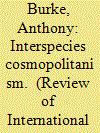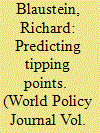|
|
|
Sort Order |
|
|
|
Items / Page
|
|
|
|
|
|
|
| Srl | Item |
| 1 |
ID:
139823


|
|
|
|
|
| Summary/Abstract |
Water is an essential building block of the Earth system and a nonsubstitutable resource upon which humankind must depend. But a growing body of evidence shows that freshwater faces a pandemic array of challenges. Today we can observe a globally significant but collectively unorganized approach to addressing them. Under modern water management schemes, impairment accumulates with increasing wealth but is then remedied by costly, after-the-fact technological investments. This strategy of treating symptoms rather than underlying causes is practiced widely across rich countries but leaves poor nations and many of the world's freshwater life-forms at risk. The seeds of this modern “impair-then-repair” mentality for water management were planted long ago, yet the wisdom of our “water traditions” may be ill-suited to an increasingly crowded planet. Focusing on rivers, which collectively satisfy the bulk of the world's freshwater needs, this essay explores the past, present, and possible future of human-water interactions. We conclude by presenting the impair-then-repair paradigm as a testable, global-scale hypothesis with the aim of stimulating not only systematic study of the impairment process but also the search for innovative solutions. Such an endeavor must unite and cobalance perspectives from the natural sciences and the humanities.
|
|
|
|
|
|
|
|
|
|
|
|
|
|
|
|
| 2 |
ID:
193305


|
|
|
|
|
| Summary/Abstract |
Cosmopolitanism claims to be the most just and inclusive of mainstream approaches to the ethics and practice of world order, given its commitment to human interconnection, peace, equality, diversity, and rights, and its concern with the many globalised pathologies that entrench injustice and vulnerability across borders. Yet it has largely remained oblivious to the agency, power, and value of non-human life on a turbulent and active Earth. Without rejecting its commitments to justice for human beings, the article challenges its humanism as both morally and politically inadequate to the situation of the Anthropocene, exemplified by the simultaneous crises of climate change, mass extinction, and the COVID-19 pandemic. In answer, the article develops new grounds and principles for an interspecies cosmopolitanism, exploring how we can reimagine its ontological foundations by creating new grounding images of subjectivity, existential unity, institutional organisation, and ordering purpose. These, in turn, can support political and institutional projects to secure the rights of ecosystems and people to flourish and persist through an increasingly chaotic epoch of human dominance and multispecies vulnerability across the Anthropocene Earth.
|
|
|
|
|
|
|
|
|
|
|
|
|
|
|
|
| 3 |
ID:
138552


|
|
|
|
|
| Summary/Abstract |
At the time he attended the 2004 European Open Science Forum in Stockholm, German physicist Hans Joachim Schellnhuber had been speaking out publicly since the late 1990s about climate change impacting what he termed “the Achilles heels of the Earth system.” Using science-speak, he talked of “switch-and-choke points” and “large scale discontinuities” to describe the possibility that key natural systems whose stability we take for granted—like the Atlantic Ocean’s jet stream and a mechanism called the thermohaline circulation, which circulates warm water globally—could abruptly change under climate change stress.
|
|
|
|
|
|
|
|
|
|
|
|
|
|
|
|
|
|
|
|
|